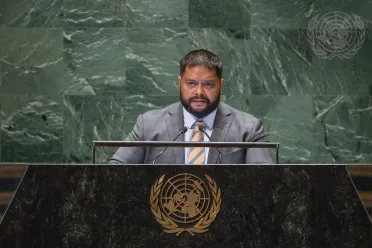Statement
Statement summary
RUSS KUN, President of Nauru, noted that for his country, the smallest Member State, United Nations ideals have an important resonance. “Will only the strong survive, or will we work to ensure that no one is left behind?” he asked. In his region, there are too many “studies upon studies” without enough support for critical on the ground projects. “It’s a small island for goodness sakes — it’s like we’re trying to launch a rocket to the sun,” he stated. Shifting Nauru and others back on track to achieve the 2030 Agenda for Sustainable Development will require a more nuanced system of categorization. Based on existing measurements for ODA — gross national income and GDP — Nauru is eligible for neither grants nor loans; however, those measurements do not capture the country’s vulnerabilities. He called for adoption of the multidimensional vulnerability index to ensure that Nauru is measured as it truly is — a struggling, small island developing State in great need of significant financial aid.
Looking to another pathway to accelerate action on the 2030 Agenda, he cited recognition and incorporation of the special circumstances of the upcoming small island developing State (SIDS) conference in May 2024 in Antigua and Barbuda. “If we are to make good on the promises for which the United Nations stands for, the next SIDS conference must deliver the transformation needed to ensure that SIDS are more resilient to external shocks,” he stressed. However, any progress made is at risk if the international community does not address the threat of climate change. The adverse impacts are no longer a “future” problem. It is essential that the global community accelerate its efforts to adapt and mitigate climate change and keep a 1.5ºC limit to temperature rise within reach. He further expressed disappointment that the goal of $100 billion a year in climate finance has not been reached and that the distribution of funds allocated has not been equitable.
On energy transition, he noted that deep seabed minerals are a central solution, with polymetallic nodules providing the alternative for big emitters to make a just energy transition away from fossil fuels and towards much cleaner and renewable energy technologies. In this regard, he called on members of the International Seabed Authority to fulfil its obligation and finalize the exploitation regulations that ensure collection of seafloor minerals are conducted with utmost responsibility, and respect for marine ecosystems while providing benefits for all humankind. As a “large ocean State”, Nauru welcomed the adoption of the BBNJ Treaty, reiterating the critical importance of ensuring sustainable fisheries. This includes ensuring that overfishing is eliminated, fair prices are paid to small islands for fish taken from their waters, and “that we eliminate illegal, unreported, and unregulated fishing,” he stressed.
Citing measures taken during the COVID-19 pandemic, including a stringent “capture and contain” strategy — which saw all visitors to Nauru required to undergo testing and quarantine at the border — he nonetheless stressed that the country needs support and technical expertise to develop innovative solutions to address viral risks. Thanking “our friends from Cuba” for their help, he called for an end to the embargo imposed by the United States. He further acknowledged “the Republic of China (Taiwan) for their help and support”, and for recognition of their right to participate and engage within “this global forum”. Emphasizing that the Security Council and the international financial architecture must be reformed because they are “just not working anymore”, he affirmed that “in Nauru’s case like other small island developing States, we become victims within the global architecture and compromise our freedom and voice as a sovereign State.”
President Russ Joseph Kun of Nauru stressed the urgency of climate action and transition from fossil fuels. Highlighting the potential of deep seabed minerals, particularly polymetallic nodules, as a key solution for that shift, he called on the International Seabed Authority to regulate the responsible use of these minerals to ensure its benefits for all humankind while protecting marine ecosystems.
Full statement
Read the full statement, in PDF format.
Photo

Previous sessions
Access the statements from previous sessions.
